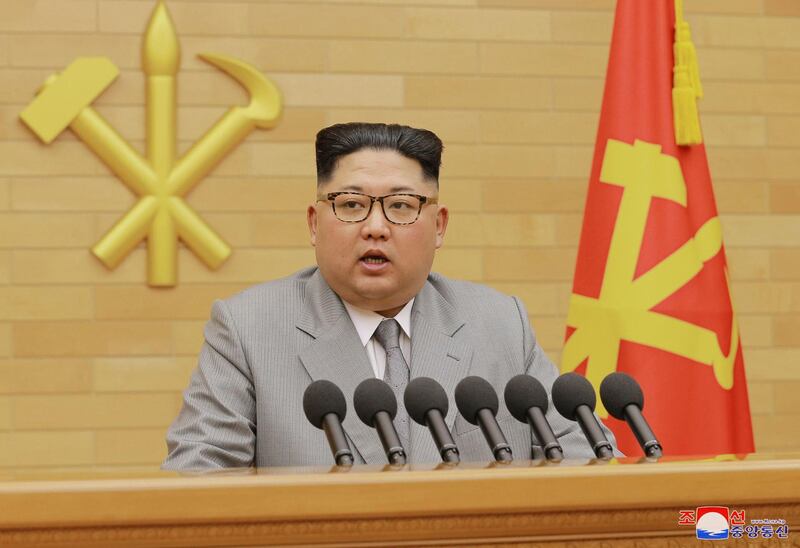North Korean leader Kim Jong Un may not really have a nuclear button on his desk, but he has found a way to undermine the unity of his two principal foes: South Korea and the US.
Mr Kim used his New Year’s address to boast of his metaphorical nuclear button while also offering direct talks with Seoul. The offer was quickly accepted by South Korean president Moon Jae-in, underscoring differences between the US and its long-time ally over confronting North Korea’s nuclear weapons programme.
While US president Donald Trump has been wary of negotiations unless Mr Kim first abandons his nuclear ambitions, Mr Moon won election on a platform of engagement.
The same week that Mr Trump ridiculed Mr Kim’s arsenal, Mr Moon’s government suggested a January 9 meeting in the border village of Panmunjom and accepted a call from North Korea over a hotline between the nations.
“Here you have the United States all but threatening war with North Korea and simultaneously you have South Korea leaning forward in an aggressive fashion to accommodate North participation and dialogue,” said Evans Revere, a former US diplomat in South Korea. “These things are happening simultaneously, and it is in direct contradiction to the fundamental thrust of US policy.”
Mr Kim’s offer, which follows repeated requests for dialogue from South Korea, adds to tensions that have lingered between Mr Trump and Mr Moon since the US president’s inauguration almost a year ago. While the two Asian nations will ostensibly limit discussions to the prospect of North Korea taking part in the Winter Olympics in South Korea next month, both sides have raised the possibility of more open-ended talks, an idea the US sought to discredit.
The US is "very skeptical of Kim Jong-un's sincerity in sitting down and having talks," state department spokeswoman Heather Nauert said Tuesday. Mr Moon's spokesman, Park Soo-hyun, said the South is willing to have talks no matter the time, place or format.
A US National Security Council official said that anyone reassured by Mr Kim's New Year's message must have been drinking "too much champagne".
The official pointed to sections of Mr Kim’s speech calling for ramped-up production of nuclear warheads and ballistic missiles, the deployment of a nuclear counterattack posture and reunification of the Korean Peninsula.
_______________
Read more:
North Korea reopens cross-border communications with South Korea
Trump boasts of 'bigger' nuclear button in retort to Kim Jong-un
Kim vows North Korea will mass-produce nuclear warheads and missiles
_______________
Not all those themes are new for Pyongyang, but the regime’s improving weaponry suggested it seeks reunification by dividing South Korea from the US and then promoting unity with its southern neighbour through nuclear blackmail, according to the official.
“I’m worried about what the South Koreans are doing,” said Elliot Abrams, a senior fellow at the Council on Foreign Relations. “I think they’re falling into a North Korean trap. If you keep moving in the direction as the South Korean president may wish to do, then ultimately you run the risk of undermining the US-South Korea military relationship.”
Publicly, US officials have downplayed the possibility of a rift, and the dispute over the trade deal has been put on the back burner.
“Kim Jong-un may be trying to drive a wedge of some sort between the two nations - between our nation and the Republic of Korea,” Ms Nauert said. “I can assure you that that will not happen. That will not occur.”
South Korea’s dependence on the US for a nuclear deterrent probably limits Mr Moon’s options in talks with North Korea. While Mr Kim might seek an easing of sanctions and the cancellation of joint military drills, analysts said easier measures would include humanitarian assistance and reuniting separated families.
Even so, Mr Moon is intent on finding a peaceful resolution, and South Koreans have more directly at stake in any conflict. Seoul’s 10 million people are within easy firing range of North Korea’s artillery, and would suffer the brunt of the first retaliatory blows in any conflict.
Mr Kim’s nuclear advances have prompted some US officials to signal that they might have to risk collateral damage in Seoul to protect the American homeland from a threatened nuclear attack. Mr Moon has fought to dispel that notion, even claiming last year that he had the right to veto any US military action against North Korea.
Mr Moon’s challenge will be delivering results with North Korea while making a sacrifice the US is willing to accept, said Katherine Moon, a senior fellow at the Brookings Institution and a professor of Asian Studies at Wellesley College in Massachusetts.
“North Korea wants many things including economic access, so the price tag to negotiate with North Korea on anything is much higher than it ever was because of its nuclear capability now,” she said. “People should not assume that because these overtures have been made that it’s going to be follow the yellow brick road, a little bit of fun and that’s that. It’s going to come with a high cost.”





